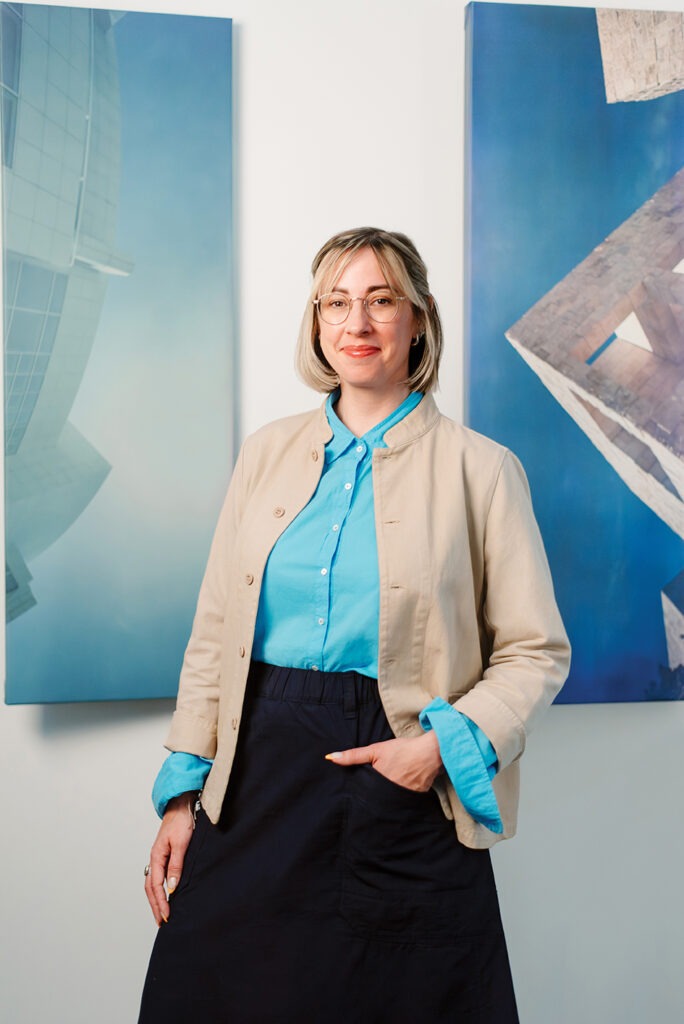Stories Blog / Community Stories / Thrive Magazine
You’re still one family
Melissa Bourgeois’s practice is changing how couples divorce.

Law has been called the “burnout profession.” A 2022 study found that billable hours and emotional demands of clients contribute significantly to burnout and mental-health challenges in the profession — factors that can hit family lawyers particularly hard, as they navigate some of the most challenging circumstances families face, like divorce and custody.
Melissa Bourgeois, founder of One Family Law, has seen firsthand the toll that traditional practice can take on lawyers and clients alike. As a family lawyer for over a decade, she’s felt it herself. “I was kind of at the end of my rope in terms of the traditional models of family law. It just didn’t make sense to me,” Bourgeois says.
“It was something that I found difficult even when I was representing just one client, to forget that the other person was a human having their own lived experience.”
Searching for a better, gentler way to practice took her to London in 2019, where legal professionals had started representing divorcing couples together. The model, referred to as “One Couple, One Lawyer” or joint representation in England and Wales, allows a lawyer to represent both sides in a legal separation.
For Bourgeois, it seemed like a no-brainer, offering a streamlined process with less financial burden on couples who, as Bourgeois puts it, take different paths while maintaining love, respect and care for each other. But before she could start practicing in this innovative way, she had some hoops to jump through. The Law Society of Alberta’s code precludes lawyers from representing opposing parties in active dispute. But not every divorcing couple sees themselves as opposing each other. “This was a really big seismic shift for the Law Society (of Alberta) to conceptualize, the concept of one lawyer being able to help both people,” she explains.
It took two-and-a-half years for her practice to be granted a special 18-month pilot, through the Law Society of Alberta’s Innovation Sandbox, which allows lawyers and businesses to explore innovative ideas and services in a regulated space. With funding from Edmonton Community Foundation’s Social Enterprise Fund (SEF), she launched the pilot in January 2023. This pilot phase allowed her to direct time to research. Rather than focusing solely on the day-to-day, the SEF funding enabled One Family Law to do its legal reform work and research.
The pilot was successful and the Law Society extended One Family Law permission to practice on an ongoing basis. She hopes this will allow more families across the country to access this kind of practice, as she works on expanding One Family Law and preparing to train other lawyers in the methodology — she’s still the only lawyer practicing law this way in North America. Without funding from SEF, Bourgeois wouldn’t be able to keep the lights on, or research and develop materials to expand this kind of practice and help more families — and push for wider reform. “I don’t run a traditional law firm,” she says. “It’s a legal reform project.” That legal reform follows a shifting culture around divorce. Thirty-eight per cent of marriages in Canada end in divorce. Rates peaked after “no-fault” divorce became legal in Canada in 1986, a reform which meant couples could divorce more easily.
“Healthier families make healthier kids, and then they grow up to be healthy humans.”
Couples divorce for all kinds of reasons beyond circumstances like abuse and infidelity. Many divorces today are amicable. Couples may grow apart, but still have love for each other and a desire to co-parent. Every time Bourgeois does media, she says, One Family Law gets more interest from clients. There’s a huge demand for this new way of doing things. As Bourgeois sees in her practice, many parents today have seen the trauma that divorce inflicts on children — and they want to minimize the impacts of divorce on their families and broader social circles. One Family Law is not building cases as much as helping families come up with a plan for moving forward together, even as their family is changing. “The shift does come in the clients themselves, acknowledging and accepting (their) relationship has changed,” Bourgeois says. “We can still coexist peacefully, even if we choose to untangle ourselves from a legal perspective.”
By responding to clients’ changing needs, One Family Law is shifting the experience of divorce — not only for the couple going through it, but for their families, social circles and everyone else who comes in contact with the family. As Bourgeois says, professionals can find themselves in the crosshairs of an acrimonious divorce where the two parties are locked in battle.
“You’re still one family. It just looks a little bit different.”
And rather than completing the divorce process years and tens, even hundreds, of thousands of dollars later, exhausted and bitter, families “leave our offices very grateful and thankful and really empowered to move forward together,” Bourgeois adds. The traditional way of practicing family law does not leave people empowered, she adds. That new approach has implications for the future, too. One Family Law isn’t just transforming divorce — they’re helping build a kinder world.
“I just believe in the power of kindness and love can really change and transform.”